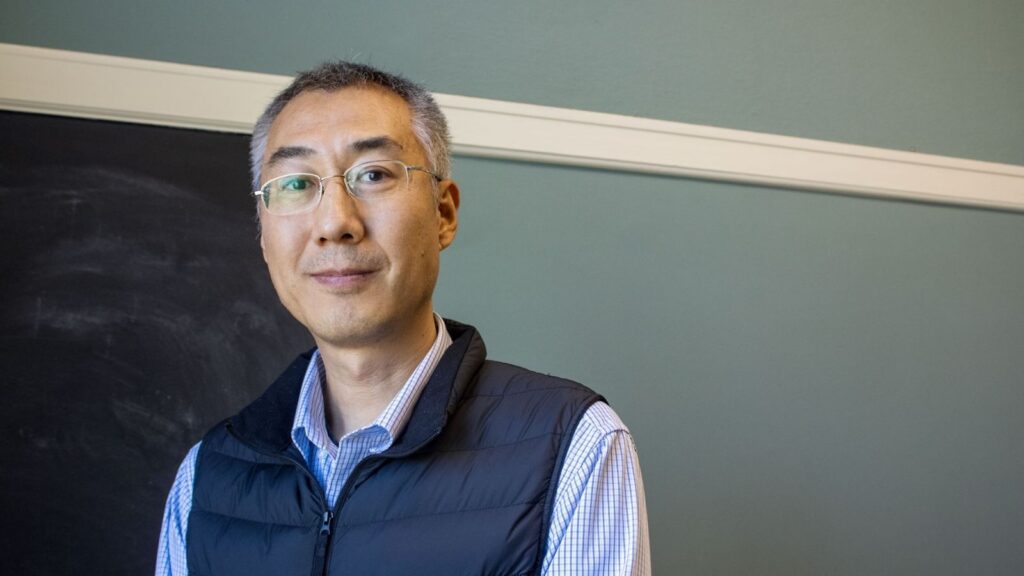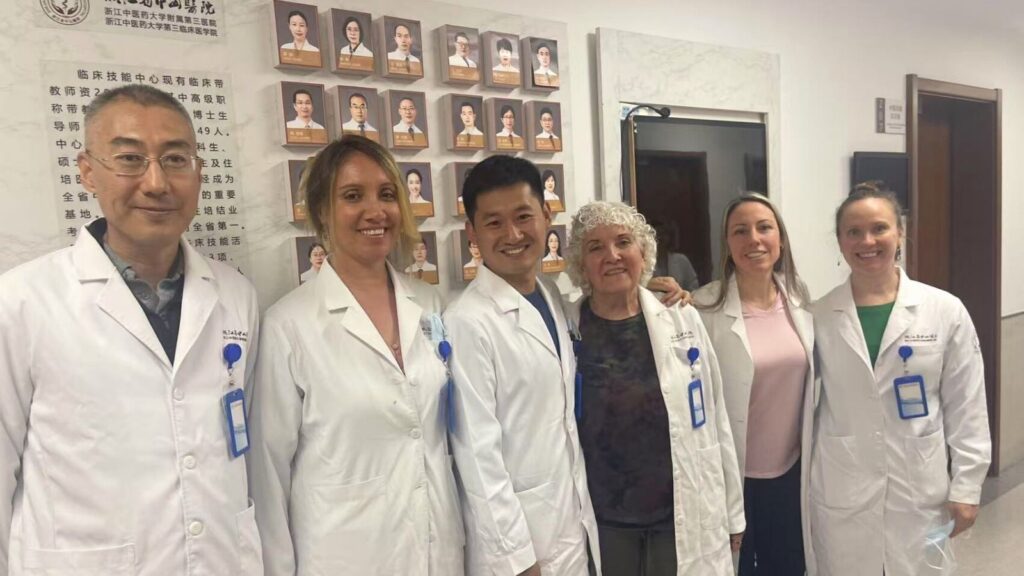New CCM dean focuses on curriculum, collaboration, and building awareness for a new generation of practitioners.

Long before Dr. Dongcheng Li chose to pursue a career in Chinese medicine, he watched with curiosity as his grandmother treated patients in their home in China.
“She would feel the pulse and observe the tongue,” Li said. “In Chinese medicine, these are important factors that count toward a patient’s diagnosis, followed by asking them questions to identify or prescribe an herbal remedy.”
In April, Li was named dean of the College of Classical Chinese Medicine (CCM) at the National University of Natural Medicine (NUNM). This new role followed years of study, teaching, clinical practice, and exploration of the field through both traditional and modern lenses.
“I think what excites me most is the opportunity to support the next generation of Chinese medicine practitioners by strengthening their educational and clinical foundations,” he said. “This is an opportunity to help students at the university and through the school’s platform.”
Over the years, Li recognized the potential for Chinese medicine to grow within academia in the United States. Trained in both Eastern and Western medical paradigms, he recognized a wealth of untapped possibilities, despite challenges like limited insurance coverage and competition from related disciplines.
By addressing this global divide and the gaps in holistic practice, Li said Chinese medicine could begin to expand—at NUNM, across the nation, and worldwide.
“Education is a tool that can become part of the practice. In this profession, we’re constantly talking to patients and educating them on how and why a treatment works.”
— Dr. Dongcheng Li
Early Foundations in Medicine
As a fifth-generation practitioner, Li understood the demanding training required for his field. In China, obtaining a doctorate in medicine could take more than 13 years, followed by several more in clinical practice to become specialized in certain disciplines.
After completing his bachelor’s degree in traditional Chinese medicine at Inner Mongolia Medical University and a master’s in Chinese herbology from Zhejiang Chinese Medical University—a path that took eight years—Li was eager to continue his education abroad.
He began researching programs through U.S. News & World Report but found few tailored to students with a background such as his. As a basketball enthusiast who had a growing interest in acupuncture, he ultimately chose to pursue a Master of Science in Exercise Physiology at the University of Texas at Arlington (UTA).
“Athletes often turn to acupuncture not only for physical recovery, but also to enhance their performance,” Li said. “Before games, some even seek treatment to feel more focused or energized.”
He didn’t know it at the time, but this academic curiosity was already guiding him toward NUNM.
After graduating from UTA, he began teaching at acupuncture schools across the country—first at the American College of Acupuncture and Oriental Medicine, and later at the Atlantic Institute of Oriental Medicine in Florida, where he opened his own private practice.
Gradually, Li began to see how education flowed out of the classroom setting, and into his role in clinical care.

“Education is a tool that can become part of the practice,” he said. “In this profession, we’re constantly talking to patients and educating them on how and why a treatment works.”
This insight led him to earn a Doctor of Education degree from Johns Hopkins University in 2022, determined to better communicate the value of Chinese medicine to students, patients, and the broader community.
While researching acupuncture and evidence-based education for his dissertation, Li connected with the Helfgott Research Institute and Dr. Heather Zwickey, now VP of Research and Academic Excellence at NUNM. To his surprise, she immediately agreed to serve on his dissertation committee, and he said the two remained in touch over the years.
In 2024, Li expanded his teaching and practice by launching a cultural education program through Global Traditional Chinese Medicine (Global TCM), an online platform he had developed in previous years to support professional development in acupuncture and herbal medicine.
The program connected U.S. students with practitioners in China, offering hands-on clinical experiences in Chinese hospitals and rare insight into medical education abroad.
“It’s a chance for students to see techniques they might never encounter in the U.S.,” he said. “These experiences can really build their confidence and capacity to practice as they move ahead.”
Strengthening the Profession
Li discovered his current role as dean through those lasting connections he made with NUNM. The position appealed to him as an ideal opportunity to bring his expertise and vision to the university to help shape the future of Chinese medicine education.
“We’re part of a living tradition with the power of healing through medicine—that extends across body, mind, and spirit.”
One of his immediate priorities was to assess the CCM curriculum, identifying how the university might better support its students—including those who recently transferred to NUNM following the closure of the Oregon College of Oriental Medicine (OCOM).
“Our university may look different when compared to other dedicated Chinese medicine schools across the nation,” he said. “But I believe we can create our own unique transmission program in the future.”
Li said he views NUNM’s interdisciplinary structure as one of the university’s key strengths, where both students and faculty can collaborate across program areas such as integrative medicine, nutrition, and research.
“This creates a lot of opportunities for students—which might not exist at other schools—to further innovation and ideas,” he said. “This is one of our particular advantages, in my personal opinion.”
Li is practical when discussing areas where both the field and university can benefit from growth.
Pointing to the national gap in post-graduate training for Chinese medicine programs, he noted that while MDs and naturopathic doctors both have a clear route to residencies, holistic practitioners typically lack such a path.
He emphasized how NUNM could be visionary in that respect, leading the development of a new model.
Another of his goals is to address public awareness and overall understanding of Chinese medicine, which he said is often too narrowly associated with acupuncture in the West. This limited perception can stunt growth of the profession, as well as healthcare policy, and does not account for routine aspects of treatment such as herbal medicine, dietary therapy and lifestyle guidance.
“There are so many widespread health issues that can be easily prevented with simple modifications in lifestyle and behavior,” Li said, “and some may even be resolved through one or two treatments.”
He adds that many practice-aligned habits in Chinese medicine can have sweeping benefits for individuals and communities alike—further reducing the spread of common illness, reliance on pharmaceuticals, and overall strain on healthcare systems.
Li hopes this reminds practitioners of their power to effect meaningful change in the field, both professionally and personally.
“We’re part of a living tradition with the power of healing through medicine—that extends across body, mind, and spirit,” he said. “In this work, you will benefit yourself, serve others, and be proud of your career, but it requires a commitment to learn continuously.”
At NUNM, Li sees himself as more than just a college dean—he is a mentor as well.
In either position, he said his mission is to guide the next generation of students and practitioners to become leaders in the field.
“I’m very grateful to be able to walk this path alongside you,” he said. “And for those students who consider NUNM and a career in Chinese medicine—I’m here to help in any way I can to offer support that will help you reach success.”
Written by Ashley Villarreal, Marketing Content Specialist